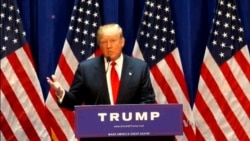Donald Trump is surging in the polls and that has a lot of Republicans worried. A recent CNN/ORC poll had Trump in second place nationally with 12 percent support, trailing only former Florida governor Jeb Bush who had 17 percent.
Trump was ahead of other Republican contenders, however, such as Senators Rand Paul of Kentucky and Marco Rubio of Florida, as well as Wisconsin Governor Scott Walker, who formally enters the race on Monday.
Trump set off a firestorm during his formal announcement last month with his blast at illegal immigrants. "They are bringing drugs. They are bringing crime. They are rapists. And some, I assume, are good people."
Republican Party Chairman Reince Priebus reportedly told Trump on Wednesday to “tone down” his comments on immigration, though Trump disputes that characterization. The comments also have drawn critical responses from some of Trump’s Republican rivals.
Bush told voters in New Hampshire that Trump’s views are “way out of the mainstream of what Republicans think.”
Debate looms as crucial
Trump’s surge in the polls, both nationally and in the early contest states of Iowa and New Hampshire, comes at an opportune time for his supporters. Trump is hoping to make the cut in the first debate among Republican contenders on August 6. The debate will be carried by the Fox News Channel, which will limit the debate to the top 10 Republican contenders based on a mix of national polls.
Trump appears to be striking a chord with conservative voters who favor a crackdown on illegal immigration, and who also like Trump’s blunt style, especially his vows to confront China on trade issues and to pursue a more aggressive stance in confronting the Islamic State.
But Trump appears to be a double-edged sword for Republicans. His participation in the debate could boost the television audience and might offer some lesser known Republicans an opportunity to become better known.
Some Republicans are concerned, though, that Trump’s presence will overshadow the rest of the field and his strident comments on illegal immigrants could hurt the party next year when Republicans hope to boost support among minority voters, especially Hispanics.
Walker set to jump in
Three more current or former Republican governors are set to join the already large field of Republican presidential contenders for 2016. Wisconsin Governor Scott Walker is expected to announce on Monday, Ohio Governor John Kasich will follow the week after, and former Virginia governor Jim Gilmore will announce his bid in early August.
That will bring the Republican field to 17 contenders just as the first televised debate is scheduled for Cleveland on August 6.
Analysts say Walker and to a lesser extent Kasich could have a major impact on the field.
“No matter how much people look at running during the next year as performance art, at some point someone is going to say, 'well, what have you actually done?' And Walker and Kasich have a record that they can be proud of,” said Republican analyst Scot Faulkner.
Faulkner is a big fan of former President Ronald Reagan, but he doesn’t see anyone of that stature in the 2016 field, as yet.
Walker has won three elections in Wisconsin in four years including a recall battle sparked by his efforts to end collective bargaining for most public workers in his state.
He has appeal to social conservatives, Tea Party activists and some mainstream Republicans looking for a contender who can compete with Democrat Hillary Clinton in battleground states in 2016. At the moment, Walker leads the Republican field in Iowa, which kicks off the 2016 nominating process early next year with its caucus vote.
Kasich looks to position himself as a moderate in the field and could gain traction should Bush stumble. New Jersey Governor Chris Christie also is targeting moderates, and will make his stand in New Hampshire where he hopes to take advantage of his ability to win over voters in small settings like town hall meetings, which New Hampshire voters respond to.
Sanders gains
Vermont Senator Bernie Sanders has been drawing some big crowds in Wisconsin and Maine and recent polls show he has cut Hillary Clinton’s formidable lead in both Iowa and New Hampshire.
Sanders has focused his campaign on trying to level the economic playing field for the poor and middle class. “This great country and our government belong to all of the people and not just a handful of very wealthy people,” Sanders told an enthusiastic crowd of more than 10,000 people recently in Madison, Wisconsin.
Sanders has struck a chord with liberals and college students, said John Fortier with the Bipartisan Policy Center. “Right now the criticism of Hillary Clinton from the left that maybe she is too hawkish on foreign policy and not enough concerned about [income] inequality is coming from Bernie Sanders and he is getting some traction.”
Most experts believe Clinton will prevail in the end, but they acknowledge that Sanders is creating some buzz on the campaign trail. Clinton told CNN that her campaign always believed the Democratic primary race “would be competitive’ and wherever she speaks she also brings up the income inequality argument that Sanders has made as his calling card.
Clinton also told CNN that “people should and do trust me,” an acknowledgement of polls that show voters are less trustful of her in the wake of controversies about her use of a private email account while secretary of state, and questions about the fundraising practices of the Clinton Foundation.
Sanders’ supporters are encouraged by his bump in the early contest states of Iowa and New Hampshire, and they would love nothing more than a surprise early win in either state they believe would transform the Democratic race from a coronation to a grass roots battle for support.






